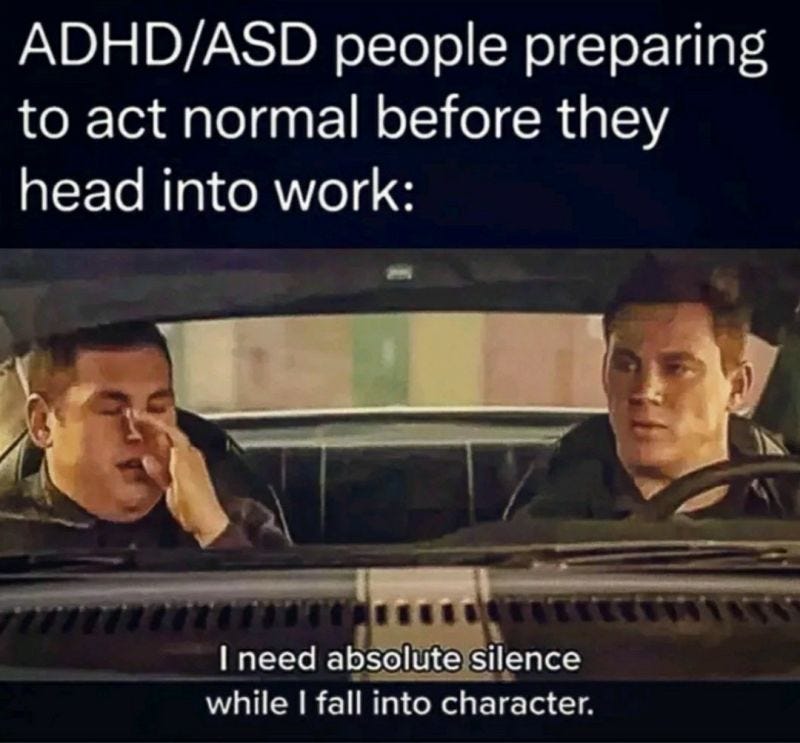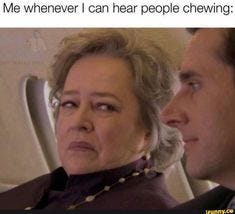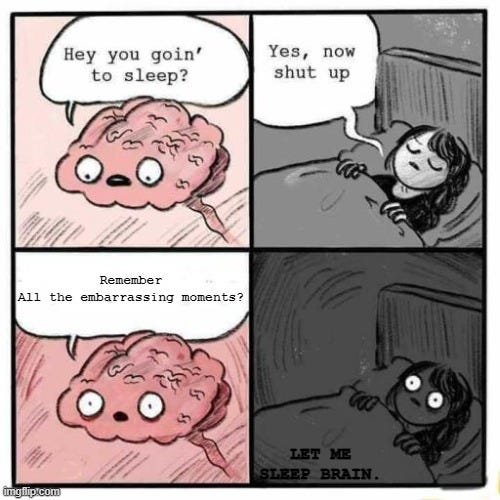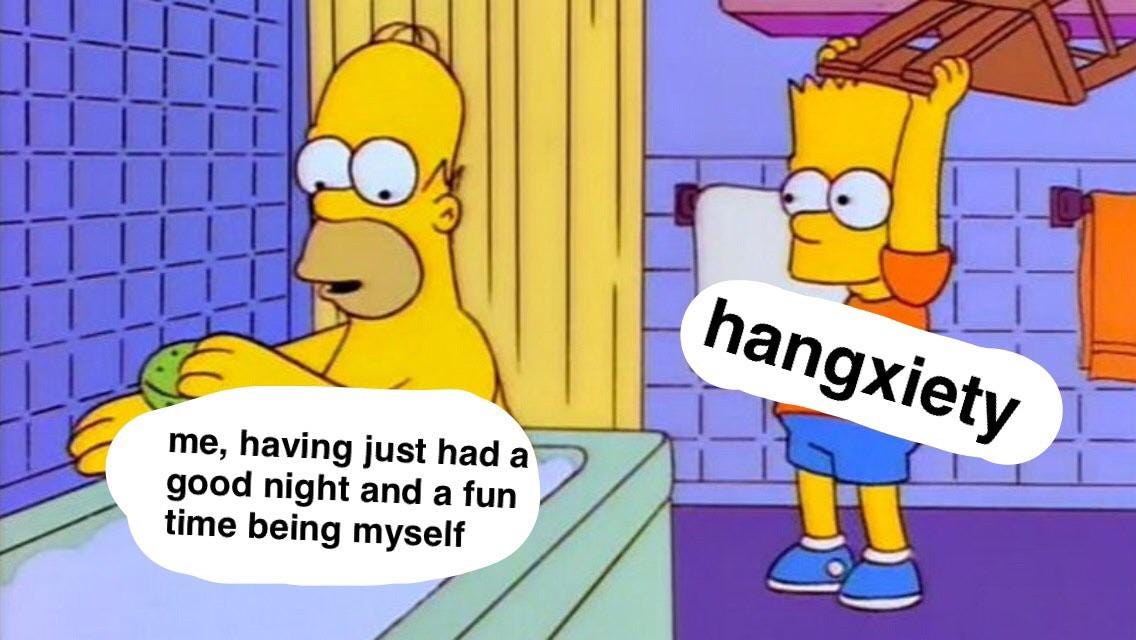Neurodivergent Masking
Like many neurodivergents, I mask around neurotypicals. I suppress natural behaviours, imitate neurotypical behaviours, adhere to The Rules, stick to The Script and do my best to hide my Weird Ways.
What is Neurodivergent Masking?
Masking is imitating neurotypical behaviours, following The Rules (what you are expected to do) and sticking to The Script (what you are expected to say). Pretending we aren’t anxious or uncomfortable, and making sure we do not to talk too loudly, too quietly, too much, too little, or too excitedly.
Masking is constantly analysing and interpreting social cues, monitoring and adjusting our actions, words, and our natural reactions, so that we appear 'neurotypical.' This vigilance not only feels inauthentic but is exhausting and anxiety inducing, because it requires a tremendous amount of mental and emotional effort. Over time, masking can erode our sense of identity and confidence as it leaves no room for our fabulous inner self to be expressed and unleashed.
The pressure of feeling I should mask comes from sensing my neurodivergent traits are not going to be accepted by the people I am with. As is typical with many neurodivergents, I have heightened emotional empathy, so I can sense in a nano second when I've made things weird. The disapproval of others permeates me and fills me with shame and panic, so I try avoid that.
Exhaustion and Anxiety
Masking is doing our best to reciprocate eye staring; feigning interest in topics we don’t enjoy, pretending we haven’t zoned out during conversations; no stimming; downplaying or hiding our special interests and hyper fixations, which means minimal guinea pig talk and crazy animal facts from me. Also, less puns and made up knock knock jokes. I am prone to overexcitedness, so I downplay my enthusiasm so that I am not annoying and ‘too much’.
When masking, we are hypervigilant to everything that is ‘unsaid’. We carefully analyse and interpret the facial expressions of others, their tone of voice and body language, and constantly vet our own responses so as not to say anything 'weird' or inappropriate. This vigilance creates a lot of anxiety and overwhelm for us.
It feels inauthentic suppressing my inner fabulous self and it can be exhausting vetting every response before it comes out. There have even been occasions where I've found it difficult to say anything at all, as none of my potential responses have met the threshold for 'normal'. At my most panicked, my poor brain will offer a million responses, sometimes causing me to get stuck choosing one. This means nothing has come out and I’ve stood there grinning in what I hope to be a neurotypical way
Sensory Overload & Emotional dysregulation
Neurodivergents have a different way of processing sensory input to neurotypicals. Loud noise, bright lights, certain smells and textures can lead to an increased likelihood of sensory overload which can lead to emotion dysregulation. Many neurodivergents also experience misophonia (when specific sounds trigger a strong stress response). Certain sounds, like chewing or whistling make us feel enraged within a nano second.
Hiding our discomfort at environmental and sensory triggers is the most difficult aspect of masking. The sudden visceral stress responses can overwhelm us quickly, disengage our rational brain and flood us with a overpowering urge to escape, shout or cry.
We try hide our discomfort and don’t complain or request accommodations because we don’t want to be seen as difficult. And this is because the truth is that we are seen as difficult by neurotypicals when we complain
This can lead to a build-up of stress and anxiety, potentially leading to sensory overload, and extreme emotional dysregulation. If we don’t feel safe expressing our discomfort in that moment, we may supress it and later we may experience a delayed stress response.
Post Mortems of Events and Rehearsing
Masking requires immense mental effort. When I was peak masking, I would always undertake a post mortem of social interactions, combing through every detail , chastising myself for missing social cues and not blending in effectively, while anxiety and shame bubbled up to intolerable levels.
Don't say I didn’t know how to have fun after a party! 🥳 I also knew how to have fun leading up to a party, mentally rehearsing every conversation that I thought might come up, and I would do this repeatedly until the event, every moment that I was alone.
I am much better now. Not because I have evolved my way out of this anxiety, but because most of my social interactions are now within my neurodivergent community. We are consciously shame free and encouraging of members to be their authentic and fabulous selves.
The Toll of Neurodivergent Masking
Masking is arguably a necessary adaptation to navigate a predominantly neurotypical world, but over time, the toll of masking becomes overwhelming. Before I found my neurodivergent community, I masked heavily and continuously. I was much more focused on fitting in and trying to make people to like me, rather than considering what I wanted or whether I even liked who I was interacting with. I didn't even know who I was, as I was so focussed on being how others wanted me to be. It took a huge toll on my mental health, leading to anxiety, burnout, a constant feeling of being misunderstood and lonely and an inability to enjoy social interactions when sober.
I often overdrank and sometimes abused substances at social events. Being intoxicated in an environment with intoxicated people is a huge relief, because when everyone is intoxicated
But obviously this is not a sustainable or healthy strategy. It made my anxiety so much worse, took me to very dark places, and took a big toll on my physical wellbeing. It is not a method I use anymore and I do not recommend anyone else uses this strategy . But it goes a way to explain why many neurodivergents abuse alcohol and drugs.
Suppressing our natural inclinations can lead to identity confusion or loss, and I struggled a lot with this before finding my tribe. Depression, anxiety and a rock bottom sense of self worth is commonly experienced by those with a weak sense of identity. Many of us mask so well that we deserve Oscar awards for our performances, and neurotypicals often don't believe us when we disclose that we are in fact neurodivergent. As you can imagine, this can have a devastating effect on our mental health and sense of identity when our “reveal” is met with scepticism or not believed.
Being an effective Masker can mean that individuals don't receive the support and accommodations they need because their challenges are not visible or acknowledged.
In conclusion, Find Your Tribe
Masking is exhausting and demeaning, as it means sacrificing our identity. These days I avoid interacting too much with people with whom I feel I have to mask heavily. I surround myself with other neurodivergents and neurodivergent allies.
I limit interacting with people who I feel uncomfortable with, rather than trying to fit in with them as I would in the past.
If you don’t have a neurodivergent community or friendship group, you might want to consider starting one up. I did that two years ago, and it was one of the best decisions I’ve ever made in my life. We are a thriving, supportive community and friendship group. I feel more connected, content, confident and happy than I have ever been and ever thought possible. Here to read more











